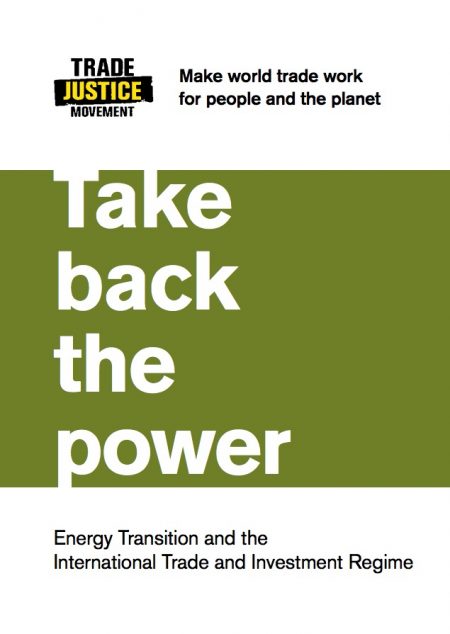Reports TJM: Take Back the Power - Energy Transition and the International Trade and Investment Regime
TJM: Take Back the Power - Energy Transition and the International Trade and Investment Regime
Much of the US$124 billion invested in the energy sector globally is protected by international trade and investment agreements. In the vast majority of agreements, investors can seek to enforce broadly defined rights via an investor-to-state dispute settlement (ISDS) clause. ISDS allows companies to sue governments in private tribunals for financial compensation if they consider that a policy or its implementation has negatively affected the profitability of their investment. In stark contrast to the climate agreement, where it was deemed impossible to make commitments fully binding, ISDS provisions make commitments to investment protection both binding and enforceable by specifically named bodies equipped with all the necessary legal powers to do so.
Half of all ISDS cases registered at the World Bank by the end of 2015 related to oil, mining, gas, electric power or other energy forms. Many of these cases have been brought under the Energy Charter Treaty (ECT): a trade and investment agreement that deals exclusively with the energy sector. There are also moves to expand the scope of trade and investment rules through the International Energy Charter (IEC). The list of stakeholders on the panel advising on this development includes the China National Petroleum Corporation, Gazprom, Shell, Dow Chemicals, BHP Billiton and BP. There is no parallel advisory panel on environmental or human rights issues.
Even if energy investors are not able to access protections under the ECT, or the IEC to come, they can look to the 2,318 Bilateral Investment Treaties (BITs) that are currently in force. They can increasingly also make use of a range of other protections against government policies they perceive as running counter to their interests, in the form of provisions contained in many of the world’s 267 Free Trade Agreements (FTAs). Investment protection chapters are also proposed for the pending ‘mega-regional’ agreements like the CETA (the EU-Canada FTA), the Trans-Pacific Partnership (TPP) and the Trans-Atlantic Trade and Investment Partnership (TTIP). If ratified, these deals would vastly increase the opportunities for foreign investors to access ISDS protections and impose significant limits on the ability of governments to implement policies in support of the energy transition.
The precedents for many of the substantive rules contained in these deals are to be found in the World Trade Organisation (WTO) agreements. This includes the principle that all other policy measures must not unnecessarily restrict or create obstacles to international trade. The WTO has also established a set of rules on subsidies, public procurement, standards (including environmental standards) and the protection of international investment. In theory, WTO rules could be used to challenge the damaging subsidies that prop up the fossil fuels industry. In reality, not a single case against state subsidy of fossil fuels has ever been brought through the WTO. In stark contrast, countries are instead increasingly using WTO rules to challenge measures to support the renewable energy sector.
It is beyond doubt that climate change is one of the most urgent issues of our time. It is also almost universally accepted that in order to address climate change, states need to radically change their energy policy. As this report outlines, there exists a significant network of trade and investment agreements that govern the energy sector. As an essentially voluntary treaty with no meaningful enforcement mechanisms and no influence over crucial macroeconomic processes, the Paris Agreement looks like a feather in the path of the trade juggernaut. We urgently need to redesign international trade and investment rules to put them at the service of climate goals, and we need to do it now – saving the battle for another day will be too late.
energy WTO
